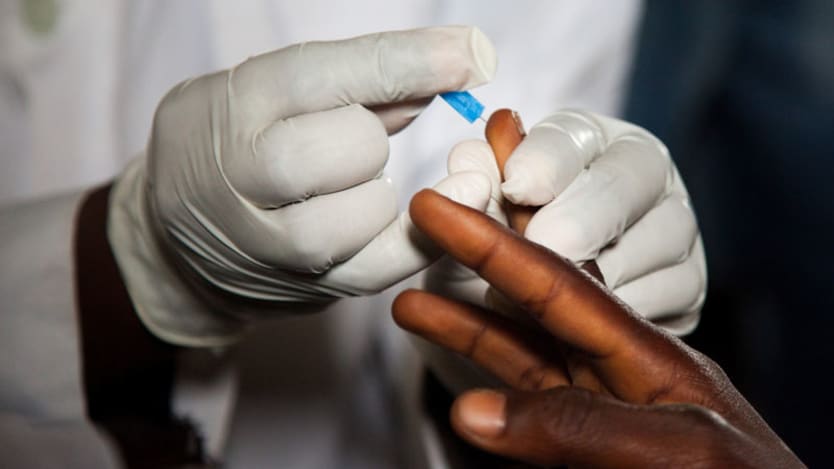
As the International AIDS Conference rolls into Amsterdam this week, so too do the world’s experts on HIV and AIDS — one in particular unveiling a new point-of-care test designed to provide health care professionals, especially in remote and under-resourced communities, with a fast, accurate, and easy-to-use device to manage HIV.
Developed by health care technology company Abbott, m-PIMA HIV-1/2 VL is the first point-of-care test of its kind, able to give an accurate viral load number in less than 70 minutes, while the patient is still present at the clinic. The rapid turn-around time helps ensure that each patient who needs a viral load test result can get one in the same visit, allowing more immediate treatment decisions, and thereby reducing the mental, emotional, and physical burdens of waiting for a result.
HIV and AIDS remain one of the world's most significant public health challenges — particularly in low- and middle-income countries — and, according to the World Health Organization, last year an estimated 20.9 million people were receiving HIV treatment.
For those already diagnosed, having a correct viral load result has been identified by WHO as crucial in determining adequate and further treatment of antiretroviral therapy, or ART. In fact, WHO recommends that those receiving ART complete a test at regular intervals. This, however, can prove challenging in countries where there is limited laboratory infrastructure, skilled staff, and transport systems.
“In terms of supporting the achievement of the overall goal of trying to end the epidemic by 2030, people who are HIV-positive need to know their status and know it as soon as possible,” explained Dr. Kuku Appiah, director of medical and scientific affairs in Africa for Abbott. The earlier a diagnosis can be made, she added, the earlier ART can be administered.
“I think the main issues that have been identified around diagnostic services are them being more accessible, user-friendly, and also, at the same time, being able to maintain quality and accuracy.”
— Dr. Kuku Appiah, director of medical and scientific affairs in Africa at AbbottSitting down with Devex, Appiah explained why the m-PIMA HIV-1/2 VL is so innovative; how it will make effective care more accessible for millions of HIV patients; is consistent with UNAIDS 90-90-90 goals; and why such technology is key to empowering health care workers in developing countries.
The conversation has been edited for length and clarity.
How can improved diagnostic services accelerate care for HIV patients?
The main issues that have been identified as important to the provision of effective diagnostic services are the ability to make them more accessible, user-friendly, and also, at the same time, maintain quality and accuracy. Point-of-care technology is one of the ways in which we are able to provide accurate, world-class diagnostics in a remote setting that is closer to the patient and without delay, as the results may be provided during the same visit.
Currently, how are HIV patients diagnosed in rural and remote places in developing countries?
People have blood samples drawn, which are then transported to a central lab. In many countries, there’s a huge backlog for testing, and consequently, a delay in the receipt of test results in a time period that would help facilitate an earlier start of treatment, maintenance of the same treatment, or change in treatment.
New technology needs to be sturdier, less temperature sensitive, and have the ability to be administered by health care professionals who may only have access to limited training. It also needs the ability to be provided at the point-of-care with access not only to testing, but also to results within the same visit.
m-PIMA HIV-1/2 VL is the first point-of-care test designed to provide health care professionals, with the ability to measure an HIV viral load in less than 70 minutes, and can be operated via mains and an external battery.
The test is anticipated to be available in 2019 in countries that have either a significant burden of HIV, or that are challenged in terms of their geographic location, as well as countries that do not have centralized labs or good sample transport. The test will not be made commercially available in the U.S.
How are such technologies likely to empower health care workers, particularly in developing country settings?
Point-of-care diagnostic technology empowers the health care worker and the patient because it allows for the health care provider to administer the test and provide the results within the same visit to the health care center. Such accessibility to testing and results helps facilitate the ability to make a decision about treatment all in one visit.
This technology also helps cuts down the workload of the health care worker, empowers them to make faster clinical decisions, and cuts down the cost and inconvenience to the patient. Access to such technology helps make it easier for people to know and consequently manage, their HIV status — supporting UNAIDS 90-90-90 goal to make effective care more accessible for millions of HIV patients.
How does diagnosis at the point of care support the 90-90-90 targets set in 2014?
The best way to end the public health threat of HIV/AIDS is by working to ensure that all people living with HIV know their status, receive ART, and, through effective disease management, reach an undetectable viral load. Those are the exact aims of the UNAIDS 90-90-90 goals.
According to the most recent UNAIDS data, the global health community has made progress against the 90-90-90 targets for 2020, but gaps remain. Currently, only 75 percent of people living with HIV know their status. Of those people who know their HIV-positive status, 79 percent are accessing antiretroviral therapy. Of the people on antiretroviral therapy, 81 percent were virally suppressed.
Diagnostic tools can help at each step of the care continuum, from knowing one’s status all the way to managing HIV with lifelong treatment. Rapid diagnostics delivered at the point-of-care help increase the rate of accurate, accessible, and actionable HIV information and are an important part of a comprehensive approach to achieving the 90-90-90 goals.
At Abbott, we are committed to developing HIV diagnostic solutions and partnerships that enable life-saving decisions that have a powerful impact on people and society. A big part of that commitment is to continue to develop portable and easy-to-use testing tools and work with partners to ensure they are available where they are most needed so that under-resourced, rural, and developing communities will have unprecedented access to HIV treatment.
Note: The m-PIMA HIV-1/2 VL test is now commercially available in select countries. Data has been submitted for CE-IVD marking and WHO PO prequalification. This product is not available in the U.S.
Search for articles
Most Read
- 1
- 2
- 3
- 4
- 5








